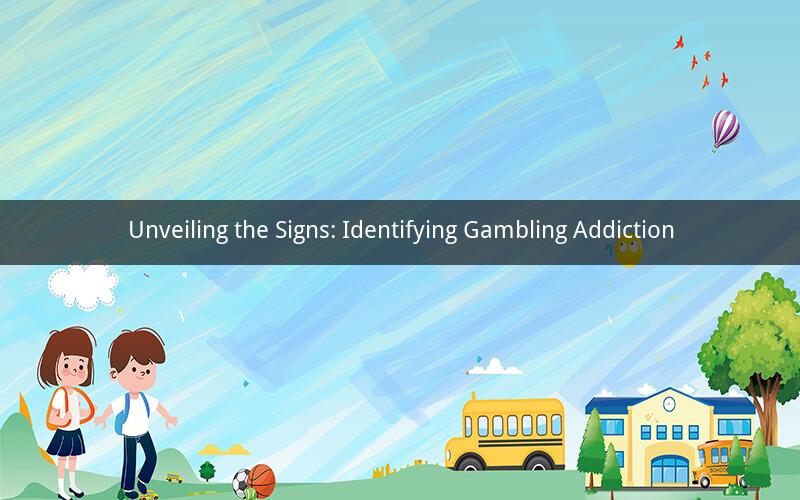
Introduction:
Gambling addiction, also known as compulsive gambling, is a significant issue affecting individuals across the globe. Recognizing the signs of a gambling addiction is crucial in order to seek help and support. In this article, we will explore the various signs and symptoms that may indicate a gambling addiction.
1. Preoccupation with Gambling:
One of the primary signs of a gambling addiction is a preoccupation with gambling. Individuals may constantly think about gambling, planning their next betting session, or worrying about their losses. They may spend a considerable amount of time researching different gambling opportunities or discussing gambling with others.
2. Increasing the Stakes:
As a person becomes more addicted to gambling, they often feel the need to increase the stakes. This means they may start betting larger amounts of money or engage in riskier gambling activities to experience the same level of excitement. Increasing the stakes can lead to significant financial and emotional consequences.
3. Lying and Secrecy:
Gambling addicts often lie about their gambling habits to hide their addiction from loved ones. They may lie about the amount of money they have spent, the time they have spent gambling, or even the frequency of their gambling activities. Secrecy is a common characteristic of gambling addiction, as individuals try to maintain control over their behavior.
4. Failed Attempts to Stop:
Individuals struggling with a gambling addiction may repeatedly attempt to stop or reduce their gambling behavior but find it increasingly difficult. They may experience intense cravings and withdrawal symptoms when trying to quit, leading them to relapse. This indicates a strong psychological and emotional dependence on gambling.
5. Financial Problems:
Gambling addiction can have severe financial consequences. Individuals may accumulate large debts due to their gambling habits, leading to financial instability and stress. They may prioritize gambling over other financial obligations, such as rent, bills, or groceries, causing significant financial strain.
6. Relationship Issues:
Gambling addiction can strain relationships with family, friends, and partners. Individuals may become irritable, aggressive, or distant due to their gambling behavior. They may neglect their responsibilities, spend less time with loved ones, and prioritize gambling over their relationships.
7. Health Problems:
Gambling addiction can have a detrimental impact on an individual's physical and mental health. It can lead to sleep disturbances, stress, anxiety, and depression. In some cases, it may even contribute to physical health issues such as heart disease or high blood pressure.
8. Legal Problems:
Gambling addiction can lead to legal consequences. Individuals may engage in illegal activities to fund their gambling habits, such as theft or fraud. They may also face legal issues related to gambling debts or violations of gambling laws.
9. Risky Behavior:
Gamblers with an addiction may engage in increasingly risky behavior, such as taking out loans, selling personal belongings, or even stealing to support their gambling habits. They may prioritize gambling over their safety and well-being, leading to dangerous situations.
10. Emotional Distress:
Gambling addiction can cause significant emotional distress. Individuals may experience feelings of guilt, shame, and despair due to their gambling behavior. They may also experience intense emotions during and after gambling sessions, such as excitement, anxiety, or relief.
Frequently Asked Questions:
Q1: How can I tell if I have a gambling addiction?
A1: Recognizing the signs of a gambling addiction is crucial. If you find yourself preoccupied with gambling, increasing the stakes, lying about your gambling habits, experiencing financial problems, and neglecting relationships, it may be an indication of a gambling addiction.
Q2: Can gambling addiction be treated?
A2: Yes, gambling addiction can be treated. Treatment options include therapy, counseling, support groups, and sometimes medication. It is important to seek professional help to address the underlying causes and develop strategies to overcome the addiction.
Q3: How can I support someone with a gambling addiction?
A3: Supporting someone with a gambling addiction involves understanding the addiction, offering empathy and support, and encouraging them to seek professional help. It is important to set boundaries and communicate your concerns without judgment or criticism.
Q4: Is gambling addiction a form of addiction?
A4: Yes, gambling addiction is a form of addiction. It involves the same psychological and emotional components as other addictions, such as alcohol or drug addiction. The intense cravings, loss of control, and negative consequences are common to all forms of addiction.
Q5: Can gambling addiction be prevented?
A5: While there is no guaranteed way to prevent gambling addiction, certain measures can reduce the risk. These include avoiding risky gambling environments, setting limits on gambling activities, and seeking help if you suspect you may be developing an addiction.
Conclusion:
Identifying the signs of a gambling addiction is crucial in order to seek help and support. By recognizing the preoccupation with gambling, increasing stakes, lying and secrecy, failed attempts to stop, financial problems, relationship issues, health problems, legal problems, risky behavior, and emotional distress, individuals can take the necessary steps to overcome their addiction. Seeking professional help and support from loved ones is essential in the journey towards recovery.